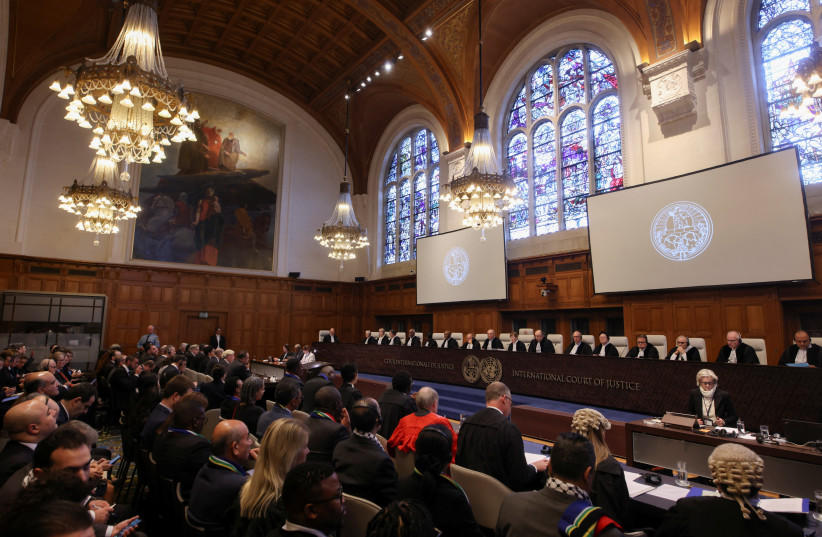In a perfect world, the 17 judges on the International Court of Justice (ICJ) panel hearing South Africa’s grotesque case against Israel for committing genocide would base their decisions only on the strength of the legal arguments.
In a perfect world.
But this is far from a perfect world, and the ICJ operates inside one of the most imperfect systems in the world: the United Nations.
Just as political considerations impact Eurovision balloting – show me a country, and I’ll tell you what to expect when an Israeli song is judged – so, too, political considerations will undoubtedly come into play here as well.
Political considerations shouldn’t come into play, and in the democracies on the panel, they probably won’t. No one in Washington, for instance, will be directing US Justice Joan Donoghue on how to vote. Nor will Canberra direct the Australian judge; Berlin, the German judge; or Tokyo tell the Japanese jurist how to rule.
But the same is not true in Somalia, China, Russia, or Lebanon.

One senior diplomatic official said no one would dare try to lobby one of the governments of the democratic countries on the panel regarding how to rule on any particular case. That is not the case in non-free countries, however, such as Somalia, China, and Russia.
As far as Lebanon goes, does anyone have any doubt about how the Lebanese justice will rule on a genocide case against Israel? Imagine Lebanese jurist Nawaf Salam voting against an injunction calling on Israel to stop the war in Gaza because of a concern it is committing genocide, and then going back to Beirut and explaining that decision to the Lebanese government, which includes Hezbollah ministers.
The 17 judges on the case
The 15 judges on the ICJ – augmented by one judge from the accusing party, South Africa, and another on behalf of the defendant, Israel – are selected on a staggered basis for nine-year terms, generally according to regional affiliation: five for Western countries, three for African states, two for Eastern Europe states, three for Asia, and two for Latin America and the Caribbean.
The 15 countries currently represented on the court are the US, Russia, Slovakia, France, Morocco, Somalia, China, Uganda, India, Jamaica, Lebanon, Japan, Germany, Australia, and Brazil.
Take a look at that lineup. If one were to handicap the verdict based on countries generally considered favorably or unfavorably predisposed toward Israel, then the Jewish state could count on Slovakia, France, the US, Australia, Japan, Germany, and India – seven of the 15 judges.
In the currently unfavorably predisposed category, place six countries: Somalia, China, Brazil, Russia, Lebanon, and Morocco, even though it joined the Abraham Accords in 2020.
This leaves two wild-card countries: Uganda, which Prime Minister Benjamin Netanyahu has visited twice in the last seven years but which is seeking stronger ties with a South Africa that brought this ludicrous charge to the court, and Jamaica.
Jamaica, interestingly enough, absented itself from the UN General Assembly vote in October calling for a ceasefire in Gaza (it voted for a similar resolution in December). It is a democratic country with an independent judiciary; Uganda much less so.
In this scenario, Israel has a slightly better than 50-50 chance. Again, that is when assuming the judges will follow the political predispositions of their countries.
But there are other wild cards as well.
For instance, India – which also has an independent judiciary – very rarely, if ever, votes for Israel in the UN, and in the past has deemed voting against it in international forums as a bone it can throw to its Muslim minority and the Arab world as the price for having very strong security and economic ties with the Jewish state.
Then there is Russia and China. While based on their rhetoric during this war, it seems reasonable to believe they will vote against Israel. Both are facing accusations of genocide themselves. There is a pending case before the ICJ against Russia, stemming from its war with Ukraine, and China has been accused of genocide against its Muslim Uyghur population, though no case against it on this matter has yet has been brought to the ICJ.
Nevertheless, both countries may be hesitant to rule that Israel is committing genocide, fearing that such a precedent could boomerang against them down the line.
Again, all of the above is based on the premise that the court’s decisions will be based on considerations other than strictly legal ones. Because if the case is judged strictly on its legal merits, Israel would be cleared – one of the reasons Jerusalem decided to take part in this legal farce in the first place.
